ic garden that supplied the vegetables. A cowboy who
does needlepoint. A voracious reader, opera-lover and church-goer who bungee-jumped over
Africa’s Victoria Falls, the tallest bungee jump in the world.
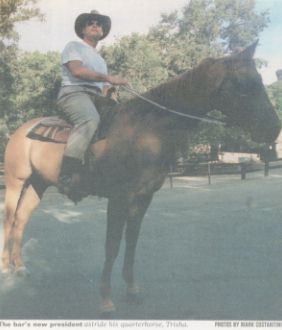 “Palmer
is very hard to label,” says Jim Garrett, a partner with Morrison and Foerster and a
longtime friend. “God broke the mold when he made Palmer.” “Palmer
is very hard to label,” says Jim Garrett, a partner with Morrison and Foerster and a
longtime friend. “God broke the mold when he made Palmer.”
Garrett nevertheless offered up a laundry list of descriptives: free
spirit, independent thinker, judicial, sharp, straightforward, reserved, good heart and
good values, great sense of humor and the ability to laugh at himself. “He wants to
do the right things,” Garrett concluded.
Contra Costa County Superior Court Judge Maria Rivera, another
longtime friend, thinks Madden “will be an ideal bar president. He is a visionary,
but is also extremely pragmatic, and he has a particular skill at conducting very
efficient, very effective meetings. I think the bar will be delighted with that.”
On a recent summer morning, Madden started the day as he often does,
riding his quarterhorse Trisha through the hills surrounding his Alamo home, built on 20
acres he bought in 1972. He and his wife, attorney Susan Paulus, share the property with
two more horses, two dogs and four chickens who live in a henhouse. The couple left
high-pressure jobs last year, after 25 years in practice.
Now an arbitrator and mediator, Madden opened Palmer Brown Madden ADR
Services in January 1999, ending 13 years in the Walnut Creek office of McCutchen, Doyle,
Brown & Enersen, including a stint as managing partner. Although he still considers
himself a practicing lawyer, Madden’s more relaxed life allows time for travel and
the pursuit of a seemingly endless list of interests. That pursuit might be deferred in
the coming year since Madden’s time likely will be consumed by the bar presidency, a
job which frequently requires a fulltime commitment.
“I see this as a great opportunity to be of service,”
Madden says. “I have the time, and I’m interested in the things the State Bar is
working on.
“Part of the reason I ran was because all my life, when there
were challenges, I rose to the challenge. This was another challenge.”
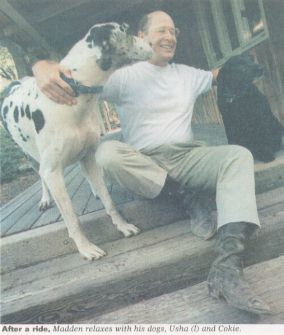 Born Sept. 19, 1945, in Milwaukee, Madden was the third child of Helen Brown
and Milton Eppley. A German Jew whose parents emigrated from Heidelberg to escape
pre-World War I anti-semitism, Eppley (who had changed his name from Epstein) was a
financier who owned Midland Finance, a regional investment firm. The couple named their
only son Milton Louis Eppley Jr. Born Sept. 19, 1945, in Milwaukee, Madden was the third child of Helen Brown
and Milton Eppley. A German Jew whose parents emigrated from Heidelberg to escape
pre-World War I anti-semitism, Eppley (who had changed his name from Epstein) was a
financier who owned Midland Finance, a regional investment firm. The couple named their
only son Milton Louis Eppley Jr.
When Madden was three, his 42-year-old father died of a stroke. His
mother remarried three years later, and Madden and his sisters were adopted by their
stepfather, Lou Madden, who also changed their names.
Madden started a somewhat checkered boarding school career at age
nine. Asked where he enrolled, he answered with a wry smile, “there isn’t a town
I didn’t go to boarding school in. I was not the easiest student to have in
class.” His academic career improved considerably in high school at
Connecticut’s Kent School, and he was accepted at Stanford University, where he
majored in history, studied in Italy for nine months and spent a year in India.
After graduating, Madden worked on the political campaign of a
college friend’s dad, James Collins, who was elected to Congress from Dallas. Madden
followed Collins to Washing-ton, serving as an administrative assistant, a job that piqued
an interest in becoming a politician. Two years as a community organizer for Vista put
that idea to rest.
He decided instead to go to law school and enrolled at Boalt Hall at
UC Berkeley. “I was very interested in my classes and did well to my surprise,”
Madden said — well enough that he was selected for the law review. “Law school
woke me up,” he said.
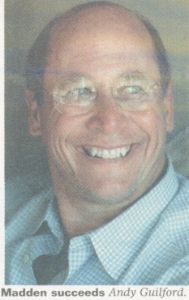 Madden’s roots as an attorney grow deep: he is the
great-great grandson of William H. “Billy” Herndon, law partner of Abraham
Lincoln in Springfield, Ill., and his mother’s father was an attorney in Wagner,
Okla. Madden’s roots as an attorney grow deep: he is the
great-great grandson of William H. “Billy” Herndon, law partner of Abraham
Lincoln in Springfield, Ill., and his mother’s father was an attorney in Wagner,
Okla.
Madden joined Morrison and Foerster in 1973, becoming the only
attorney in the San Francisco firm who wore his hair in a ponytail. Jim Garrett, the first
partner with whom Madden worked, said the hairdo caused “a fair amount of comment by
older partners, and people used to kid him about it.” No one asked him to get rid of
the ponytail, however.
In 1981, he joined Van Voorhis & Skaggs, a five-attorney firm in
Walnut Creek which grew to 25 lawyers before merging with McCutchen in 1985. In his
practice, Madden specialized in commercial litigation, including partnership disputes,
contract and fraud claims, real property disputes, construction litigation, intellectual
property matters and environmental cases.
Madden stayed with McCutchen until last year, and his election makes
him the fifth McCutchen partner to serve as State Bar president.
During his years of active practice, Madden developed an interest in
pro bono work and alternative dispute resolution and he began to volunteer with the State
Bar. At one point, he negotiated an arrangement under which he worked half-time for
half-pay, freeing him to write and to take on pro bono work. He taught at law school and
became the lead editor and writer at CEB on the law of politics, covering such issues as
conflicts of interest and campaign contributions. He joined the board of the Kennedy King
Foundation, raising money from the Contra Costa County business community to help send
low-income students to college.
Among his biggest achievements, Madden counts his work on the Mono
Lake litigation, which went to the Supreme Court and forged new environmental law, and a
1995 $15 million jury verdict, the largest in Contra Costa County until last year.
When a backlog of civil cases grew in the county, Madden joined a
panel of attorneys created to ease the situation, meeting once a week with a judge to
mediate four or five cases. “I became interested in the process that way,” he
says, “and my own cases were settling that way.”
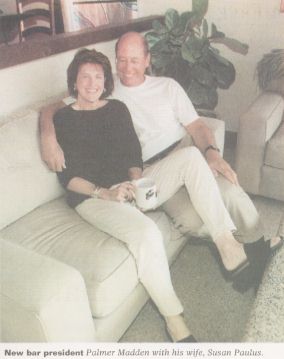 All the while Madden’s practice was flourishing, he pursued an eclectic
variety of outside interests. Before finishing law school, Madden began what would become
an 18-month project — design and construction of a 3,000-square foot house on his
Alamo acreage. He and his former wife knew nothing about building, Madden said, and
enlisted the help of an architectural student and friend who gave them the benefit of his
expertise at the rate of $4 an hour. He still lives in the house, whose massive sliding
glass doors disappear into a wall to open the living room to the outdoors. Madden admits,
though, that the windows have always leaked. All the while Madden’s practice was flourishing, he pursued an eclectic
variety of outside interests. Before finishing law school, Madden began what would become
an 18-month project — design and construction of a 3,000-square foot house on his
Alamo acreage. He and his former wife knew nothing about building, Madden said, and
enlisted the help of an architectural student and friend who gave them the benefit of his
expertise at the rate of $4 an hour. He still lives in the house, whose massive sliding
glass doors disappear into a wall to open the living room to the outdoors. Madden admits,
though, that the windows have always leaked.
In 1978, Madden, his wife and two partners opened the Creative
Learning Center, a pre-school whose philosophy was to find a child’s strengths and
encourage them. The school was sold in 1986, but continues to operate.
He also opened a restaurant in 1981, designed, he said, “to
combine do-gooding with commercial enterprise” by offering natural foods in a
business that was a model of energy efficiency. An organic garden at the site was the draw
for customers, who then dined at the restaurant; the money was reinvested in the garden.
Madden’s wife ran the place and he worked as the greeter in the evenings after work.
The restaurant, since sold, is still in business.
Despite his many interests, Madden said he does not consider himself
a joiner. He and Paulus are active in their church — she as a grief counselor —
and they travel extensively. He skis, sails, scuba dives and swims a mile three times a week. A voracious
reader, he reads “anything and everything,” usually two or three books
simultaneously, and leans toward science, history (with a particular interest in George
Washington), religion and junk novels.
Paulus, who was head of litigation for McKes-son Corp. in San
Fran-cisco and met Madden when they were on opposite sides in a large civil case,
describes her husband as “the most creative person I know. He’s terrific on his
feet, a wonderful speaker, he’s funny, he’s caring.” What sets him apart,
she adds, is “his unwillingness to do something just because it’s
accepted.”
Those qualities, as well as his business savvy and mediation
experience, should serve him well at the helm of the State Bar, where he says a key goal
will be to remove the board of governors from day-to-day operations and focus instead on
broader policy questions. He hopes the board will create a priority list that includes
issues such as multidisciplinary and multijurisdictional practices, diversity in the legal
profession, unauthorized practice of law, the future of MCLE and a look at the attorney
discipline system.
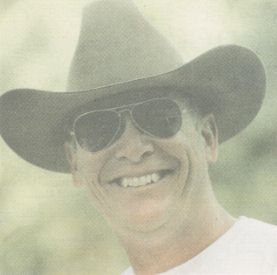 Madden does not come
from a long history of bar activism and does not consider himself a bar
“junkie,” but he is a fan of lawyers and a strong supporter of the organization
which he says benefits California attorneys. Without the bar’s discipline and
admissions operations, he points out, anyone could practice. “The core parts of the
bar are in good shape and need to be protected,” he says. “We need to put
politics behind us and focus on what the bar does well.” Madden does not come
from a long history of bar activism and does not consider himself a bar
“junkie,” but he is a fan of lawyers and a strong supporter of the organization
which he says benefits California attorneys. Without the bar’s discipline and
admissions operations, he points out, anyone could practice. “The core parts of the
bar are in good shape and need to be protected,” he says. “We need to put
politics behind us and focus on what the bar does well.”
Paulus thinks Madden is just the man for the job. “The board of
governors is at a point where it needs some creative thinking combined with
consensus-building and persuasiveness,” she says. “Palmer has all those
qualities better than anybody I know.” |

